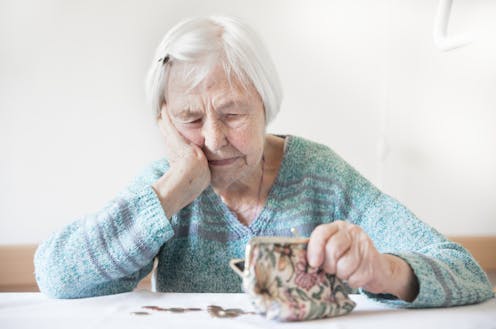why healthier ageing isn’t just about personal choices
- Written by Simon Evans, Lecturer in Neuroscience, School of Psychology, University of Surrey

We’ve all heard it before: eat your five-a-day[1], and try to get some exercise. It’s advice that’s simple in theory, yet in practice, not everyone is able to follow it. So what’s standing in the way?
Our research[2] examined this question in depth. Using data from UK adults over the age of 50, we explored how socioeconomic status affects the likelihood of meeting the World Health Organization’s recommendations for physical activity[3] and diet. These guidelines include at least 150 minutes of moderate-intensity (or 75 minutes of vigorous-intensity) physical activity per week and a daily intake of at least five portions of fruit and vegetables.
What we found points to a clear and concerning disparity. Wealthier older adults are nearly twice as likely to meet both exercise and dietary recommendations compared to their less affluent peers. And perhaps even more striking, those who don’t meet these health guidelines are significantly more likely to suffer from depression.
We analysed survey responses from more than 3,000 adults aged 50 to 90, using data from the English Longitudinal Study of Ageing[4]. While nearly 70% of participants reported doing some form of physical activity, the data revealed a sharp wealth divide.
Adults in the highest wealth quintile (the top 20%) were almost twice as likely to be physically active as those in the lowest quintile. A similar pattern emerged for diet. Over 70% of those in the wealthiest group reported meeting the five-a-day guideline, compared to just over 40% in the lowest income bracket.
This matters, because not meeting government guidelines for physical activity and diet can have serious long-term health consequences[5]. Regular exercise is known to increase HDL (or “good”) cholesterol, improve cardiovascular health, and reduce the risk of chronic conditions like type 2 diabetes, heart disease, and some cancers.
It also benefits brain health by lowering inflammation and even promoting the growth of new brain cells[6]. Similarly, diets rich in fibre, vitamins, and antioxidants – found in fruits and vegetables – are associated with[7] lower the risks of disease and cognitive decline, including conditions like Alzheimer’s.
Depression disparity
But the impact isn’t just physical. Our research also explored links between lifestyle and mental health. Around 19% of participants met the criteria for clinical depression, with the highest risk found among women, people living alone, smokers and those with lower incomes.
Alarmingly, rates of depression were nearly three times higher among those in the lowest wealth quintile (32.6% were depressed) compared to those in the highest (11.1%).
Lifestyle clearly played a role in depression levels. Among inactive participants, 30% reported symptoms of depression – more than double the rate seen in those who were physically active (13.7%). Likewise, those who didn’t meet the five-a-day guideline had a depression rate of 23.4%, compared to 15.7% among those who did.
These results suggest that staying physically active and eating well not only improves physical health but may also play a protective role in mental wellbeing. Yet not everyone has equal access to the resources, time, or environments that support healthy living. There is also the role of social isolation as a compounding factor.
Social disconnection is strongly linked to[8] both poor physical and mental health, including depression and even increased mortality risk. Physical activity programmes that also offer social interaction – such as walking groups or community exercise classes – may provide even greater benefits.
Healthy ageing for everyone
The evidence shows that health disparities in later life are deeply tied to wealth and socioeconomic status. This means that addressing them requires more than encouraging personal responsibility – it calls for policy action.
Financial barriers to healthy food and physical activity need to be tackled through targeted programmes, subsidies and infrastructure investments. Making healthy options accessible and affordable – especially for those in lower-income groups – will benefit people and reduce strain on healthcare systems.
As populations continue to age, promoting health in later life is a public health priority. But that effort will only succeed if it recognises – and works to reduce – the inequalities that hold people back from living healthy, fulfilling lives.
References
- ^ five-a-day (www.nhs.uk)
- ^ Our research (link.springer.com)
- ^ recommendations for physical activity (www.who.int)
- ^ English Longitudinal Study of Ageing (www.elsa-project.ac.uk)
- ^ serious long-term health consequences (academic.oup.com)
- ^ promoting the growth of new brain cells (doi.org)
- ^ are associated with (doi.org)
- ^ strongly linked to (doi.org)







